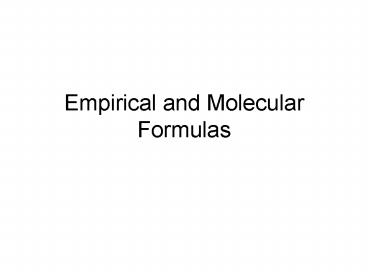Empirical and Molecular Formulas PowerPoint PPT Presentation
Title: Empirical and Molecular Formulas
1
Empirical and Molecular Formulas
2
Empirical Formula
- If we are given an unknown substance how could we
determine its chemical formula? - We can determine its percent composition
- Then we can determine its empirical formula the
simplest whole-number ratio of atoms in a compound
3
- However, the empirical formula does not
necessarily give information about the number of
atoms in a molecule (molecular formula).
Molecular Formula Empirical Formula
C2H2 CH
C4H4 CH
C6H6 CH
- The empirical formula gives the combining ratio
in its simplest form - The molecular formula gives the same ratio but
with the actual number of atoms - Note The empirical formula and the molecular
formula can be the same in some cases. E.g. H2O,
CH4, CO2
4
Calculating Empirical Formula
- E.g. What is the empirical formula of a substance
that is 40.0 carbon, 6.70 hydrogen, and 53.3
oxygen by mass?
Given Assume 100 g mC 40.0 g mH 6.70 g mO
53.3 g
? The empirical formula of the substance is CH2O
5
Calculating Molecular Formula
- The empirical formula tells us the simplest ratio
of atoms in a molecule, but it does not tell us
the actual number of atoms in a molecule - However, if we know molar mass and the empirical
formula of a compound we can determine its
molecular formula - Divide the molar mass of the compound by the
molar mass obtained from the empirical formula - Multiply the subscripts by this number
6
- E.g. What is the molecular formula of a compound
that has a molar mass of 34 g/mol and the
empirical formula HO?
Given Empirical Formula HO MMcmpd 34
g/mol MMHO 1.01 16.00 17.01 g/mol
? The molecular formula of the compound is H2O2
7
- E.g. What is the molecular formula of a compound
that has a molar mass of 45.00 g/mol and the
empirical formula CH3?
Given Empirical Formula CH3 MMcmpd 45.00
g/mol MMCH3 12.01 3(1.01) 15.04
g/mol
? The molecular formula of the compound is C3H9
8
Calculating Molecular Formula
- We can calculate molecular formula if empirical
formula and molar mass is given - We can also calculate molecular formula if
percent composition and molar mass is given.
9
- E.g. What is the molecular formula of a compound
with a molar mass of 58.0 g/mol and a percent
composition of 82.5 C and 17.5 H?
Given C 82.5 H 17.5 MM 58.0 g/mol m
58.0 g (Assume 1 mole)
Mole ratio CH 410
? The molecular formula is C4H10
10
Homework
- P. 186 2-6
- P. 188 1-6
- P. 193 8,9
11
Hydrates
- Solid ionic compounds are formed from dehydrating
ionic solutions - Some of the liquid water molecules may remain
between molecules of the solids, creating a
hydrate - When a hydrate is heated and water is evaporated
it is referred to as anhydrous
12
Hydrate Example
- A 50.0 g sample of a hydrate of barium hydroxide
was heated. The anhydrous solid weighed 27.2 g. - Determine the percent composition of water in the
hydrate. - Calculate the molecular formula of the hydrate.
Name the hydrate. - Hint Start with a BCE
- Ba(OH)2?xH2O Solve for x

